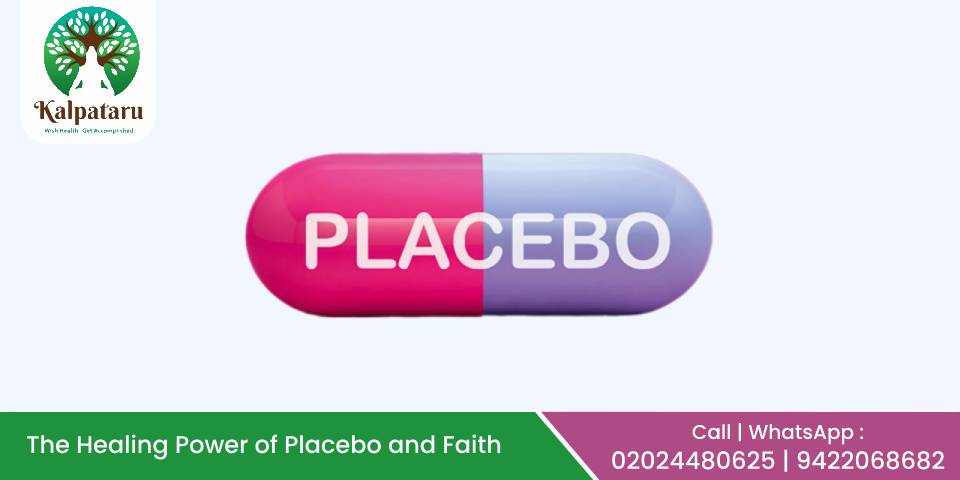The connection between the mind and body is truly amazing. One fascinating example of this is the placebo effect, where belief and faith can help in the healing process. Let’s explore the science, history, and cultural significance of the placebo effect and its Ayurvedic connections.
What is Placebo?
A placebo is a treatment or substance that doesn’t have any actual medicine in it but can still make a person feel better. In medicine, placebos are often used to compare real medicines with fake treatments to see how much of the healing comes from the medicine itself and how much comes from belief.
Placebo in Ayurveda: Daiva Vyapashraya Chikitsa
In Ayurveda, there is a similar idea called Daiva Vyapashraya Chikitsa, which means “spiritual or divine therapy.” This method is used when other treatments don’t work. It involves practices like chanting, worship, wearing gemstones, or doing rituals to increase the patient’s mental strength and belief in recovery. This belief often helps patients feel better and heal faster.
A Historical Example: Placebo in World War II:
During World War II, injured soldiers were given morphine injections to ease their pain. But one time, the morphine ran out. A smart doctor used a saline solution instead and told the soldiers it was morphine itself. Surprisingly, 40-50% of them felt relief. This shows how trust and belief can change how we feel.
How Placebo Works?
Studies show that about 35% of patients get better just by believing in their treatment. Placebos have helped in treating:
- Asthma
- Parkinson’s Disease
- Depression
- Migraines
- Irritable Bowel Syndrome (IBS)
- Chronic Pain
- Back Pain
- Skin diseases and so many ailments.
When people believe in a treatment, the brain releases special chemicals that help the body heal. These chemicals improve the immune system, balance hormones, and promote recovery.
Interesting Medical Trials:
One study on knee surgery for osteoarthritis divided patients into two groups. One group had real surgery, while the other group only had a small cut on their knee without any surgery. Both groups felt almost same level of pain relief and improved movement. Some patients who couldn’t walk properly before started walking without help even after fake surgery. This shows the power of belief in healing.
Hypnosis and Placebo:
Another example of the mind’s power is seen in hypnosis. In one experiment, a person was hypnotized and told they were being burned with a cigarette, even though only a finger touched their skin. Afterward, a blister appeared as if they had been burned. This proves how deeply the mind can influence the body.
Psycho-Neuro-Immunology:
This new field studies how our thoughts and emotions affect our immune system and hormones. Positive thinking and strong belief can make the body healthier, reduce inflammation, and speed up healing.
Spiritual Belief and Health:
Having strong spiritual beliefs also helps mental and physical health. Studies show that people with faith are less likely to feel depressed or anxious. Brain scans reveal that spiritual people have thicker brain areas ( like hypothalamus) that protect them from stress and mental illnesses( Reduced Amygdala in size) . Faith gives hope and strength, which supports both the mind and body.
Modern Applications of the Placebo Effect:
Doctors today use placebos in various ways to help patients. For example, in some cases of chronic pain, doctors prescribe sugar pills while explaining their potential benefits. Patients often report significant improvements because they trust their doctor and believe in the treatment. Similarly, many wellness programs emphasize positive affirmations and visualization techniques, which leverage the placebo effect to boost recovery and mental health.
The Role of Mindfulness and Meditation:
Practices like mindfulness and meditation also tap into the power of the mind. By focusing on positive thoughts and reducing stress, these practices enhance the body’s natural healing processes. They align closely with the placebo effect, as both depend on the belief that the mind can influence the body’s health.
Lessons from Traditional Healing Practices:
In many traditional cultures, healers use rituals and ceremonies to inspire faith and hope in their patients. These practices often work not just because of the remedies but because they create a strong sense of belief and emotional support. Such approaches highlight the universal role of faith and mental strength in healing.
Conclusion:
The placebo effect shows how powerful belief and faith can be in healing. Whether it’s through modern medicine or Ayurveda’s Daiva Vyapashraya Chikitsa, the mind plays a huge role in recovery. Combining mental strength with medical treatments could transform healthcare. The power of belief isn’t just in our heads—it’s a real force for healing and transformation.
By understanding and using the placebo effect, we can unlock new ways to improve health and well-being. It reminds us that healing is not just about the body; it’s also about the strength and resilience of the human spirit.
Dr. Manoj Deshpande and Dr. Aparna Deshpande at Kalpataru Ayurvediya Chikitsalaya™ Clinic provide the best Ayurvedic Treatment for Psoriasis & various diseases in Pune, Maharashtra. For more information about our comprehensive treatment options, or to requestan appointment with the best Ayurvedic Doctor in Pune, call +919422068682 / +919764837167 / 020-24480625 or Click on Book an Appointment.

